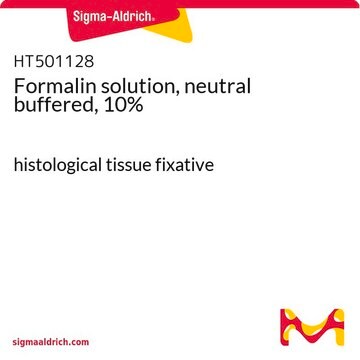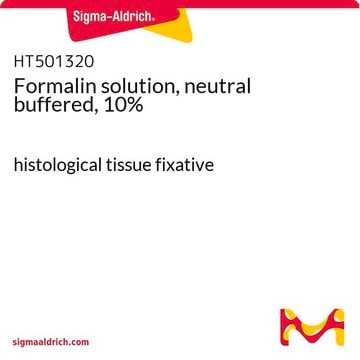1.00496
Formaldehyde solution 4%, buffered, pH 6.9
(approx. 10% Formalin solution) for histology
Synonym(s):
Formaline solution, Methanal solution, Methyl aldehyde solution
About This Item
Recommended Products
Quality Level
form
liquid
IVD
for in vitro diagnostic use
concentration
3.8-4.2% (acidimetric)
color
colorless
pH
6.7-7.1 ( in H2O)
bp
100 °C/1013 hPa
mp
-92 °C
density
1.017 g/cm3 at 20 °C
application(s)
diagnostic assay manufacturing
hematology
histology
storage temp.
15-25°C
Related Categories
General description
Signal Word
Danger
Hazard Statements
Precautionary Statements
Hazard Classifications
Acute Tox. 4 Inhalation - Acute Tox. 4 Oral - Carc. 1B - Muta. 2 - Skin Sens. 1
Storage Class Code
6.1D - Non-combustible, acute toxic Cat.3 / toxic hazardous materials or hazardous materials causing chronic effects
WGK
WGK 3
Flash Point(F)
Not applicable
Flash Point(C)
Not applicable
Certificates of Analysis (COA)
Search for Certificates of Analysis (COA) by entering the products Lot/Batch Number. Lot and Batch Numbers can be found on a product’s label following the words ‘Lot’ or ‘Batch’.
Already Own This Product?
Find documentation for the products that you have recently purchased in the Document Library.
Customers Also Viewed
Protocols
Cultivate ReNcell® human neural stem cells in 3D hydrogels for high-throughput screening using the TrueGel3D® HTS Hydrogel Plate with this protocol.
Cultivate ReNcell® human neural stem cells in 3D hydrogels for high-throughput screening using the TrueGel3D® HTS Hydrogel Plate with this protocol.
Cultivate ReNcell® human neural stem cells in 3D hydrogels for high-throughput screening using the TrueGel3D® HTS Hydrogel Plate with this protocol.
Cultivate ReNcell® human neural stem cells in 3D hydrogels for high-throughput screening using the TrueGel3D® HTS Hydrogel Plate with this protocol.
Related Content
Learn about the criticality of biological tissue staining for research and clinical pathology using standard and special stains and dyes.
Learn about the criticality of biological tissue staining for research and clinical pathology using standard and special stains and dyes.
Learn about the criticality of biological tissue staining for research and clinical pathology using standard and special stains and dyes.
Learn about the criticality of biological tissue staining for research and clinical pathology using standard and special stains and dyes.
Our team of scientists has experience in all areas of research including Life Science, Material Science, Chemical Synthesis, Chromatography, Analytical and many others.
Contact Technical Service







